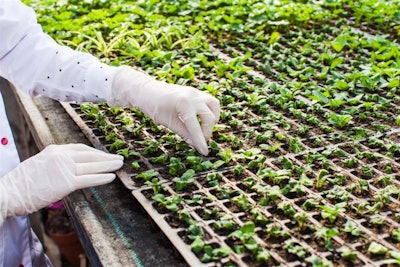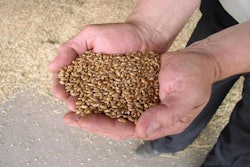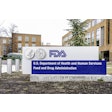
The U.S. Department of Agriculture’s (USDA) Agricultural Marketing Service (AMS) has issued a proposed rule to establish the National Bioengineered Food Disclosure Standard (NBFDS) passed by Congress in 2016.
AMS said the new rule would require food manufacturers and other entities that label foods for retail sale to disclose information about bioengineered (BE) food and BE food ingredient content. The proposed rule is intended to provide a mandatory uniform national standard for disclosure of information to consumers about the BE status of foods.
The proposed rule is intended to provide for disclosure of foods that are or may be bioengineered in the interest of consumers, but also seeks to minimize implementation and compliance costs for the food industry – costs that could be passed on to consumers, AMS said.
“The amended Act defines ‘bioengineering’ with respect to a food, as referring to a food ‘that contains genetic material that has been modified through in vitro recombinant deoxyribonucleic acid (DNA) techniques; and for which the modification could not otherwise be obtained through conventional breeding or found in nature,’” AMS said. “In accordance with its statutory mandate and for purposes of consistency, AMS proposes to directly incorporate this statutory definition into the definition of ‘bioengineered food’ without further interpretation of what ‘bioengineering’ means, but welcomes public comment on what could be considered to constitute ‘bioengineering.’
“At the outset, for all on-package text disclosure options and alternatives, AMS proposes using the terms ‘bioengineered food’ or ‘bioengineered food ingredient.’ AMS considered using alternative phrases, such as ‘genetically modified’ or ‘genetically engineered.’ However, AMS is not proposing any similar terms because it believes the statutory term, ‘bioengineering,’ adequately describes food products of the technology that Congress intended to be within the scope of the NBFDS. AMS proposes to differentiate between BE food and BE food ingredients through the on-package text disclosure alternatives. It believes this approach would recognize that some foods are entirely a product of bioengineering and that some foods are a mix of BE and non-BE food ingredients.”
AMS is seeking comments on the proposed rule for 60 days after publication in the Federal Register, which is expected on Friday.
Ag groups react to proposed rule
The National Corn Growers Association (NCGA) said the proposed rule is “a critical step towards establishing a National Bioengineered Food Disclosure Standard by the July 29, 2018, deadline.”
“The Coalition for Safe Affordable Food remains committed to a standard that gives consumers access to information about the food they purchase; ensures that farmers continue to have the tools they need to feed a growing world population; and provides certainty to food manufacturers, retailers and others in the supply chain,” NCGA said in a statement.
“Over 1,100 national, state, and local organizations representing the food and agriculture value chain supported enactment of the Bioengineered Food Disclosure Act, because it prevented a state-by-state patchwork of labeling laws, that would have cost U.S. consumers, farmers and manufacturers billions of dollars.
“Given the importance of ensuring the final rule is in place by the statutory deadline, the Coalition will be analyzing the proposed rule and developing coordinated food and agricultural industry comments over the next 60 days. The Coalition looks forward to providing the Department with input that reflects the needs of consumers, farmers and the rest of the food value chain.”
The National Grain and Feed Association (NGFA) said the proposed rule “represents a significant step toward establishing a final standard that is designed to give consumers access to more information about the bioengineered content of the food they purchase, while providing for national uniformity in bioengineered food labeling that is essential to providing consumers with continued access to a safe, abundant and affordable food supply.”
The NGFA noted that the safe use of crop biotechnology in food long has been verified by numerous governmental, international and domestic scientific and regulatory bodies, including the National Academies of Science, Engineering and Medicine, the U.S. Food and Drug Administration (FDA), the American Medical Association, and the World Health Organization.
“Thus, the bioengineered food labeling standard is about providing more access to information to consumers; it most emphatically is not a food safety standard,” the NGFA said. The NGFA noted USDA’s affirmation that the regulatory oversight provided by federal agencies ensures that foods produced using bioengineering methods meet all relevant federal health, safety and environmental standards.















